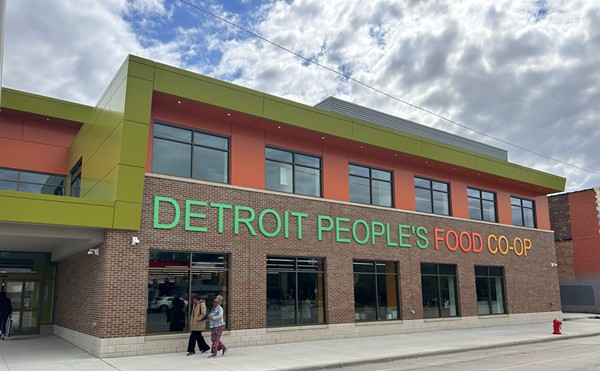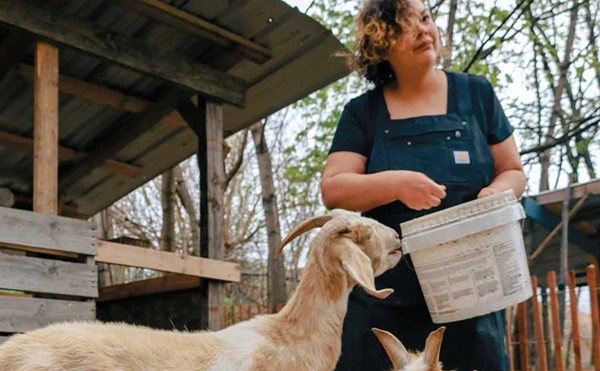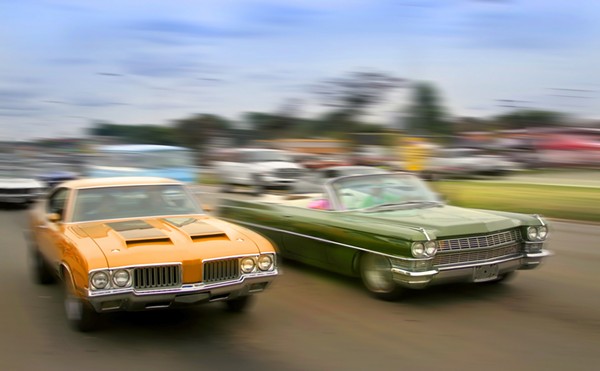As Detroit evolves, there are numerous forces impacting the nature of that evolution. I want to focus on two of them in this column, because both involve community engagement.
The first is the Detroit Black Community Food Security Network (DBCFSN), which celebrates its 10th anniversary April 22.
"The work we are doing is a model of how community members can (collaborate) to show what an empowered community looks like," says Malik Yakini, executive director of the DBCFSN.
"I feel great about this anniversary; we've undergone tremendous growth since we first began. We're now an internationally respected organization that has influenced the public discourse in Detroit about race and food."
This organization plays a huge part in taking the urban agriculture movement to a next level in the city. The members engaged with City Council to help create the Detroit Food Security Policy, which addresses the issues of access to quality food, hunger and malnutrition, economic injustice in the food system, the roles of schools and public institutions, and other issues.
That city policy in turn led to the creation of the Detroit Food Policy Council, which works with food-oriented community organizations toward achieving their goals.
The group also runs D-Town Farm, the largest in the city. It covers seven acres in the River Rouge Park area where volunteers grow 35 different crops in the course of a year. The organization runs Food Warrior youth programs at three different sites that teach about food justice, nutrition, and exercise. Another program for teenagers adds entrepreneurial skills to the lessons.
One of the biggest hurdles in urban agriculture is making the step from growing crops to selling them. DBCFSN has run a food buying club since 2009 and is in the process of creating the Detroit Food Commons. Plans for The Commons call for a Detroit People's Food Co-op, a full service, cooperatively owned grocery store. The site will include a 50-seat café, an incubator kitchen for food processing businesses, and a 6,000-square-foot community meeting space. The DBCFSN offices, currently on Puritan near Hamilton, will relocate to the building. "We're making progress on it daily," says Yakini, who expects the facility to open in late 2017.
Yakini received a prestigious James Beard Award in 2015 for "his work to ensure social justice, food equity, and food security to the people of urban Detroit," according to the Beard organization's website.
"Detroit continues to lack abundant opportunities for residents to obtain healthy food choices," Yakini says.
The anniversary celebration is a fundraiser at the Charles Wright Museum. The Gerald Hairston Award will be given to a local gardener at the event. Hairston was a pioneering urban gardener in Detroit during the 1990s. He helped form the Gardening Angels, a group of elders, many of whom had lived on farms in the South, which solidified Detroit's urban agriculture movement.
The Flint-based hip hop artist Mama Sol and Tha N.U.T.S. will perform after a reception at the museum. Call 313-345-3663 for more information.
'I'm a Detroiter and I'm not going back'
The second thing I want to discuss is a Community Engagement Brainstorm and Workshop at Bamboo, a coworking space on the second floor of a downtown building. Lauren Hood of Deep Dive Detroit was the facilitator for this gathering of some 35 mostly young entrepreneurial types. The main focus of the discussion: Community engagement, particularly the native-newcomer dynamic.
One person there admitted to having been in Detroit just one week. Another, an Irish woman who hadn't been here very long, said that she'd first tried Portland, Oregon, but didn't like it. Detroit seems to be more her kind of place.
There was some discussion of how long you have to be in Detroit before you're no longer a newcomer. Although I didn't join in the discussion, it seems to me that it depends on attitude. You could be here two years and be OK, but you could be here 10 years with the wrong attitude and not be a Detroiter.
When I was a kid, the whole newcomer thing wasn't an issue. And there were a whole lot of people here who had come from somewhere else.
An adjunct to the native-newcomer thing was the black-white thing, with the idea that most of the newcomers to Detroit are white and the natives black.
Hey, the Detroit neighborhood I grew up in (just north of Michigan Avenue near Lawton) was pretty much equally black, white and Latino.
Not all the newcomers are white, and I know white people who have lived their entire lives in Detroit. One African-American newcomer who married a Detroiter she met in the Air Force discussed what led to the idea for the business the couple is working on.
"I'm from Brooklyn and I took the bus everywhere," she said. She expected the convenience of functional public transit when she came here, telling her husband that she would just "take the bus" when she wanted to go somewhere. Anybody who takes the bus around here knows they can't be counted on.
"We knew we couldn't make the bus run on time," she says. But what they can do, or at least are trying to do, is create a GPS tracking system so that passengers can figure out where the bus is and when it's going to be at their stops. Instead of waiting 45 minutes for a bus, you can go about your business and get to the bus stop right on time.
The bottom line for her: "I'm a Detroiter and I'm not going back; I'm loving the journey."
The takeaway from this discussion was that both natives and newcomers need sensitivity. Newcomers need to respect and seek information from those who have been here longest. Natives need to accept some new ideas and make some effort to understand what others see when they look at the city.
Detroit is changing. Everything changes or it dies. But the direction of that change is not written. The efforts of the DBCFSN and many young entrepreneurs are all part of pushing that change in a positive direction.
Century of services: Finally, while I'm in the vibe of everybody getting along, I want to note that the International Institute is celebrating its "100 years of services in the areas of immigration, social services, and global education" with a 2016 Michigan International Professional Awards dinner on April 15. The event features etnhic food and performance. The awards go to first and second generation American dreamers who have made significant contributions in their professions, particularly to enhance international unity and understanding. Contact Nada Dalgamouni, Global Education Director, at [email protected].






